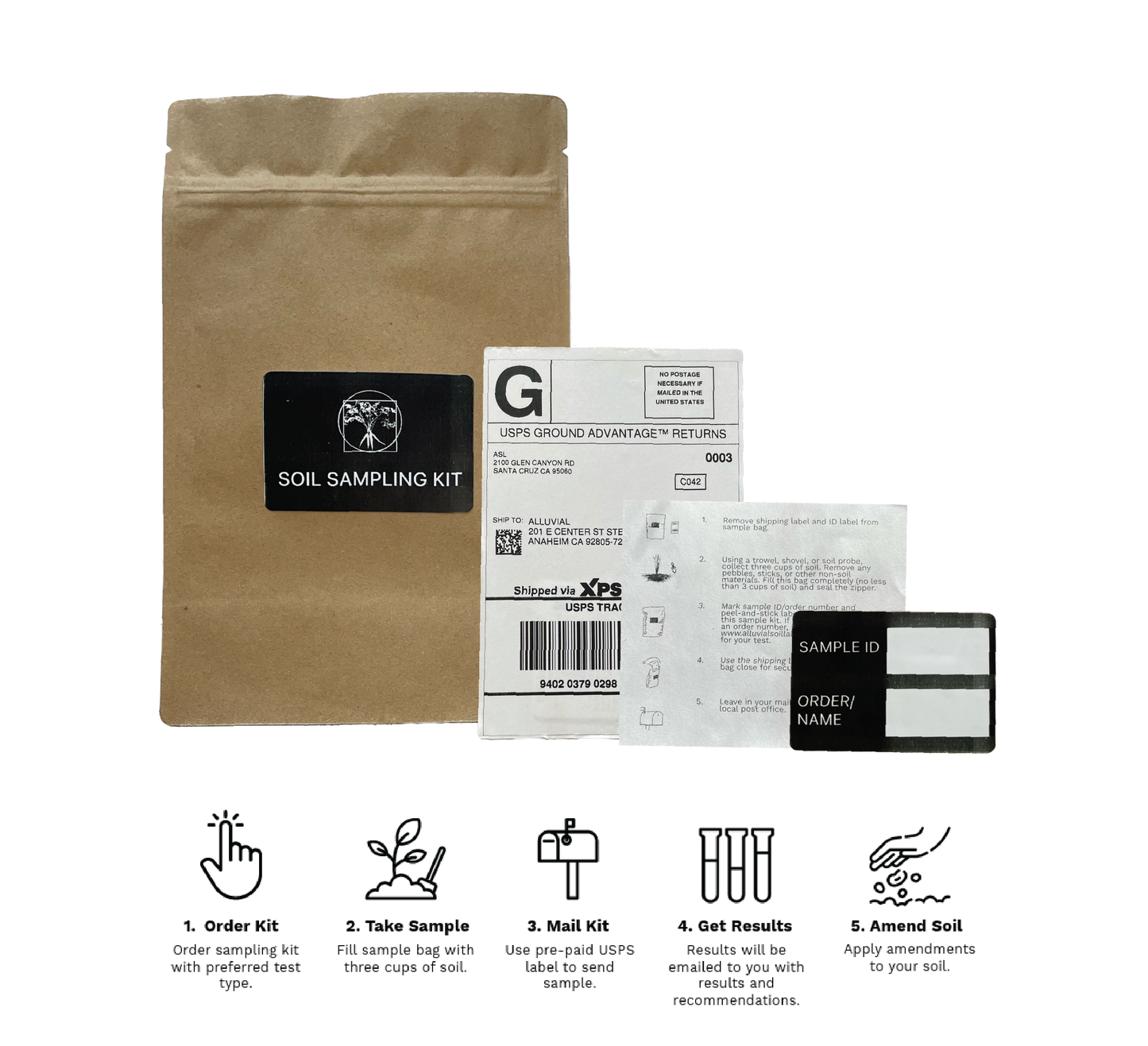Soil Microbes
Soil Microbes
A soil microbes (soil food web) soil test is a comprehensive analysis aimed at understanding the composition and activity of the soil food web in garden soil. The soil food web refers to the intricate network of interactions among various microorganisms, including bacteria, fungi, protozoa, nematodes, and other small organisms, as well as the plants and animals in the soil environment. This test provides valuable insights into the health and vitality of the soil ecosystem, offering information that can guide gardeners in optimizing soil conditions for plant growth.
Couldn't load pickup availability
- Fast Turnaround Time
- Accurate Results
- Secure PCI/SSL Payment
- 30-Day Refunds
- Expert Recommendations
- Sustainable Packaging
Report includes:
- Graphs, data analysis, and personalized recommendations with organic or conventional amendments.
- A 15-minute phone consultation with one of our soil scientists.
Interesting Details about Soil Food Web in Garden Soil:
Microbial Diversity and Plant Health: A diverse and thriving soil food web is essential for plant health. Within this web, various microorganisms perform specific roles in nutrient cycling, disease suppression, and organic matter decomposition. High microbial diversity often indicates improved soil fertility and enhances plant resilience against environmental stresses.
Nutrient Cycling and Soil Fertility: Soil microbes play a pivotal role in nutrient cycling by breaking down organic matter into essential nutrients that plants can absorb. This process not only enriches soil fertility but also ensures a continuous supply of nutrients necessary for robust plant growth and development.
Mycorrhizal Relationships: Mycorrhizal fungi establish symbiotic relationships with plant roots, facilitating nutrient absorption and water uptake. This mutualistic association significantly benefits many plant species, particularly trees, shrubs, and agricultural crops, by enhancing their nutrient acquisition capabilities and overall health.
Predatory Microorganisms: The soil food web includes predatory microorganisms such as nematodes and protozoa, which prey on bacteria and other microbes. These predators play a crucial role in regulating the populations of harmful organisms, thereby contributing to natural pest control and maintaining ecological balance.
Decomposition and Organic Matter Breakdown: Bacteria and fungi are primary decomposers in the soil food web, responsible for breaking down organic matter like plant residues. This decomposition process releases nutrients back into the soil, supporting future plant growth, and contributes to the formation of humus, which improves soil structure and fertility over time.
Indicator of Soil Health: The composition and functioning of the soil food web serve as an indicator of soil health. A balanced and diverse microbial community reflects a healthy and well-functioning soil ecosystem. Any disruptions or imbalances in the soil food web may signal underlying issues such as nutrient deficiencies, soil compaction, or chemical toxicity.
Effects of Chemical Inputs: The application of synthetic fertilizers and pesticides can disrupt the balance of the soil food web. Some chemicals may adversely affect beneficial microorganisms, leading to disruptions in nutrient cycling and potential harm to plant health. Sustainable soil management practices aim to minimize reliance on such inputs to preserve soil biodiversity and ecosystem functioning.
Resilience to Environmental Stress: A robust soil food web enhances the soil's resilience to environmental stressors such as drought and disease. Healthy soils with a diverse microbial community can better support plant growth and productivity during challenging conditions, contributing to sustainable agricultural practices and ecosystem stability.
Composting and Soil Microbes: Incorporating compost into the soil introduces a rich diversity of microorganisms, promoting a healthy soil food web. Compost provides organic matter and a plethora of beneficial microbes, enhancing soil structure, fertility, and overall ecosystem health. This practice underscores the importance of organic matter management in sustainable gardening and agriculture.
Sampling instructions
Sampling instructions
Materials Needed
i. Clean plastic bucket
ii. Shovel or soil probe
iii. Plastic bag
iv. Labeling materials (marker, tape, or label)
v. Gloves & mask (for contaminated soils)
Sampling Process
Step 1: Define Sampling Area
i. Identify the specific area for testing.
ii. Collect one composite sample per 1,000 sq. ft.
Step 2: Collect Soil Samples
i. Use a clean bucket and shovel/probe to gather soil from three spots.
ii. Dig 6 inches deep, taking a vertical slice.
iii. Avoid compost piles, pet waste, or fertilized areas.
iv. Do not sample wet soil.
Step 3: Prepare Sample
i. Remove debris, break up clumps, and mix soil thoroughly.
Step 4: Package Sample
i. Measure 3 cups of mixed soil into a resealable plastic bag.
ii. Label with Sample ID, Test Type, and Order Number.
Step 5: Submit Sample
i. Purchase a test on our website.
ii. Mail to Alluvial Soil Lab, 201 E Center St, Ste 112-3083, Anaheim, CA 92805.
iii. Use any postal carrier.
For Soil Sample Kit Users
Step 1: Prepare Kit
i. Remove shipping label, ID tag, and instructions.
Step 2: Collect & Package Sample
i. Follow the standard collection process.
ii. Fill the provided bag completely.
iii. Attach the ID tag and secure the shipping label.
Turnaround and Results
i. Timing depends on test type.
ii. Results emailed with soil composition, nutrients, and recommendations.
Safety Precautions
i. Wear gloves/mask when handling potentially contaminated soil.
ii. Wash hands thoroughly after sampling.
Following these steps ensures accurate soil testing for better gardening decisions.
Advanced details
Advanced details
Test includes:
Bacteria, Fungi, B:F, Nematodes, Ciliates, Amoebae, Flagellates. Total counts of each


Reviews
-

Jack Algiere | Stone Barns Center
Verified Purchase ✓
Alluvial Soil Lab provided us with comprehensive tests for our organic soil based greenhouse. The results were easy to read and will surely be a great tool for anyone looking to better understand their own soils.
-

Wilson H.
Verified Purchase ✓
I recently started a garden at a community plot, and wanted to know what was in my soil, so I could make more targeted amendments. Jake walked me through how to do so, and after sending my samples in... (read more)
-

Noah M.
Verified Purchase ✓
As a professional in the field I very much appreciate the timely and detailed report, along with skilled follow up communications. I will certainly use Alluvial Soil Lab's services again.
-

Zakary S.
Verified Purchase ✓
Great support and detailed report. Helped advise what options we had to plant trees! Plants are doing incredible! (read more)
-

Peggy C.
Verified Purchase ✓
I recently moved to a property with a vineyard, and wanted to know what type of fertilizers to use and how much to apply. So I did a soil test. I was new to soil testing and with Jake's help and instructions, I was able to successfully collect… (read more)
-

Adrian T.
Verified Purchase ✓
Alluvial makes complex scientific lab results accessible and legible for anyone.(read more)
-

Tom R.
Verified Purchase ✓
I wanted to start a vineyard on my land in Alpine, Ca. Unfortunately, it’s mostly clay. I contacted Alluvial and sent a soil sample...received a land rating with nutrient advice...the first test rows thrived, allowing me to plant more this Spring. Thank you! Couldn’t have done it without you. (read more)



